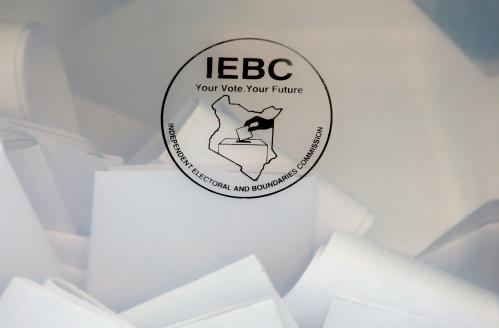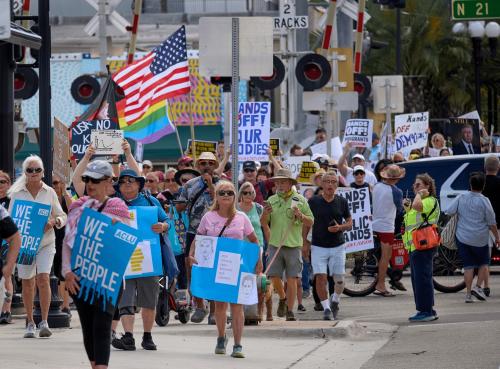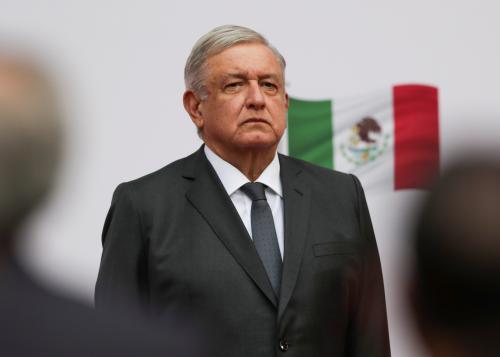In early May 1999, a high-level conference was held in Atlanta, Georgia on governance in the Americas, attended by heads of state (Costa Rica, Ecuador, Venezuela, among others), senior government officials (the then U.S. Treasury Secretary Robert Rubin), civil society leaders, and a few policy researchers like myself, working at the World Bank at the time.
I was under strict instructions from the organizers to limit my presentation to no more than seven slides in seven uninterrupted minutes. My intervention would be immediately followed by the next panelist. No interruptions from the audience were to be allowed.
The slides I had prepared were intended to let the data to do the talking. I was drawing the data from an unpublished, co-authored research paper on governance. To my surprise, within a minute into the first data slide, the man seated at the front of the very large (and otherwise very silent) audience was peppering me with probing questions about the data. Somehow, I managed to get through the slides and the plethora of questions on subsequent slides without excessive delay.
Once the session ended, the probing individual approached me and asked me to come with him to a side room to have a chat. With his outsized intelligence and intense gaze in full display, he was keenly interested in the methodology and data on governance that I was summarizing, mentioning in passing his scientific background. He was particularly keen on data being used to assess particular governance dimensions, such as democratic accountability, rule of law, conflict mitigation, and corruption.
He asked me how public the paper was and especially the data. I mentioned that given the sensitivity of the topic at the World Bank, neither was public yet, but we did plan on disseminating the research paper in the future.
He was far from satisfied, and somewhat impatient with internal political considerations. He stated rather clearly that this type of data was very important for all to have access to and be able to work with. In his words, this is a “public good in the public interest.” So, after ascertaining that I’d be back at the World Bank right after the conference, he instructed me to convey a clear message to his friend, the World Bank president at the time, Jim Wolfensohn: He wished for this work and data to be made public without further ado.
This very inquisitive man, who had flouted conference protocols with his multiple questions, and then proceeded to give me polite marching orders to transmit his message to the president of the World Bank, was President Jimmy Carter, at the time actively elevating the topics of advancing democracy and promoting peace and human rights through his Carter Center.
Upon my return to the World Bank in Washington, D.C., I went to see Jim Wolfensohn. He knew already about the work on governance that my colleague Aart Kraay and I were conducting at the World Bank research department and was very supportive of it. But he also knew about the political sensitivity coming from some members of the Board of Executive Directors representing countries with challenging standards of democratic governance, who did not think that the Bank should be performing work on these subjects, let alone with data that they could not control. That is why Wolfensohn also supported us forging ahead with our work as an independent research project, rather than as an operational initiative influencing World Bank decisions and subject to formal Board approval.
But once I mentioned to Wolfensohn my interaction with President Carter at the conference, here we were: Considering these sensitivities among some World Bank Board directors, how to make the data public in a manner consistent with it being a “public good”—as per Jimmy Carter’s “instructions”—and therefore going far beyond a narrowly read research paper, without ruffling internal feathers?
With his smarts—and commitment to the topic—it didn’t take long for Jim Wolfensohn to suggest the solution to address Carter’s plea: “You know, just place all of it on the web and that’s that,” he said. The internet was in its relative infancy at that point. With the number of internet users globally at about 400 million then, it was less than one-tenth of today’s figures, exceeding 5.5 billion users.
The “sweet spot” resided in the fact that the data and research community were ahead of organizational bureaucracies in using the web, and thus dissemination could already be relatively effective. Importantly, once the data was out on the web, there was no way to put the “genie back in the bottle.” This is how the Worldwide Governance Indicators (WGI) saw the light of day in the late ’90s. The interest in the data and its governance underpinnings grew significantly over time, to hundreds of thousands of page views per year, and tens of thousands of annual paper downloads on the WGI.
The "sweet spot" resided in the fact that the data and research community were ahead of organizational bureaucracies in using the web, and thus dissemination could already be relatively effective.
A few years after the conference at his Center, Jimmy Carter came to visit the Bank and Jim Wolfensohn and asked that I join a meeting. He was pleased to know that the governance indicators were produced annually and disclosed transparently, enjoying vast use by practitioners, policy analysts, and researchers around the world. President Carter restated his view on the paramount importance of human rights, good governance, transparency for global progress and national development, and for public health.
I thanked him for his crucial role. Well beyond the data, he walked the talk on good governance and integrity. He was one of the few U.S. presidents that did not experience scandals during his administration.
Among the many achievements that shaped President Carter’s legacy, during and after his presidency, one that may otherwise have gone underappreciated was his role in spurring over a quarter century of data on key dimensions of governance for countries around the world. He was a believer in transparent evidence and a doer of good governance.
The Brookings Institution is committed to quality, independence, and impact.
We are supported by a diverse array of funders. In line with our values and policies, each Brookings publication represents the sole views of its author(s).







Commentary
An encounter with Jimmy Carter: Unveiling the Worldwide Governance Indicators
January 16, 2025